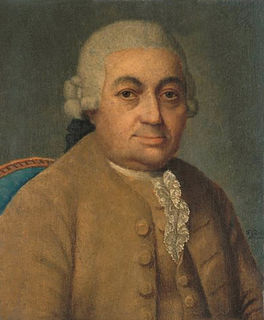A Quote by Carl Philipp Emanuel Bach
A musician cannot move others unless he too is moved. He must of necessity feel all of the affects that he hopes to arouse in his audience, for the revealing of his own humour will stimulate a like humour in the listener.
Related Quotes
A man of knowing attains to a sense of humour. Let this always be remembered. If you see someone who has no sense of humour, know well that that man has not known at all. If you come across a serious man, then you can be certain that he is a pretender. Knowing brings sincerity but all seriousness disappears. Knowing brings a playfulness; knowing brings a sense of humour. The sense of humour is a must.
You hear people talking about a Scottish sense of humour, or a Glaswegian sense of humour, all sorts of countries and cities think that they've got this thing that they're funny. I read about the Liverpudlian sense of humour and I was like, 'Aye? What's that then?' You get that and you especially hear about a dark Glaswegian sense of humour.
The true and lasting genius of humour does not drag you thus to boxes labelled 'pathos,' 'humour,' and show you all the mechanism of the inimitable puppets that are going to perform. How I used to laugh at Simon Tapperwit, and the Wellers, and a host more! But I can't do it now somehow; and time, it seems to me, is the true test of humour. It must be antiseptic.
The necessity for struggle is one of the clever devices through which nature forces individuals to expand, develop, progress, and become strong through resistance. . .We are forced to recognize that this great universal necessity for struggle must have a definite and useful purpose. That purpose is to force the individual to sharpen his wits, arouse his enthusiasm, build up his spirit of faith, gain definiteness of purpose, develop his power of will, and inspire his faculty of imagination to give him new uses for old ideas and concepts. . .
I knew the man up until our divorce - after that I didn't know the man, but it didn't stop me caring about him and worrying because of the complete change that I saw in him. He'd lost his sense of humour and he got aggressive; he wasn't for the world any more, he was just for Yoko. Before that he opened his arms and embraced the world with his wit and humour - afterwards he was a completely different kind of person.
It was humbling to play Mark Ashton. He was a political activist and a humanist, and there is incredible conviction in his vision. But when you're telling a political story, humour is crucial; otherwise, it can be in danger of becoming a bit preachy, and the audience can feel like they've got an agenda coming full steam at them.
The British have turned their sense of humour into a national virtue. It is odd, because through much of history, humour has been considered cheap, and laughter something for the lower orders. But British aristocrats didn't care a damn about what people thought of them, so they made humour acceptable.
In his own lifetime Jesus made no impact on history. This is something that I cannot but regard as a special dispensation on God's part, and, I like to think, yet another example of the ironical humour which informs so many of His purposes. To me, it seems highly appropriate that the most important figure in all history should thus escape the notice of memoirists, diarists, commentators, all the tribe of chroniclers who even then existed
For my part I think the Learned, and Unlearned Blockhead pretty equal; for 'tis all one to me, whether a Man talk Nonsense, or unintelligible Sense, I am diverted and edified alike by either; the one enjoys himself less, but suffers his Friends to do it more; the other enjoys himself and his own Humour enough, but will let no body else do it in his Company.


































